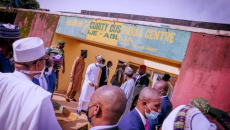In order to ensure safe and dignified burial for people who die of the Ebola Virus Disease, EVD, the World Health Organization has released new protocols to be adopted in the burial process.
The new protocol consists of 12 steps that burial teams should follow in order to ensure safe and dignified burials, and also encourage the inclusion of family members and religious rites in the planning of the burial of patients suspected or confirmed as being infected with Ebola when they died.
Pierre Formenty, WHO expert on Ebola, said at least 20 per cent of new infections occur during burials of people who died from Ebola virus disease, as the body contains high levels of the virus and is still potentially contagious for the disease.
An interdisciplinary team of experts from WHO, the International Federation of Red Cross and Red Crescent Societies and religious organizations including World Council of Churches, Islamic Relief, Caritas Internationalis and World Vision developed the new protocol.
Rehanah Sadiq, a Muslim chaplain with University Hospitals Birmingham NHS Foundation Trust in the United Kingdom who was a consultant on the preparation of the new protocol said giving families safe alternatives to retain the practices they hold dear would help them to be part of the decision-making process.
This, she said, is critical particularly during a time when they may be feeling helpless.
A part of the protocol requires that medical burial teams do not wear the personal protective equipment, PPE when they first meet with the family of the deceased.
It also stipulates that they ask the family if they have any specific requests about managing the burial and the deceased’s personal effects.
According to the WHO, feedback from religious and community leaders, as well as the burial teams would be sought and used to update and improve the protocol.
In the latest situation assessment reports of the UN health agency, there have been 13,042 confirmed, probable and suspected cases of Ebola virus disease as at November 2, 2014, while reported deaths were 4,818.
Six countries including Guinea, Liberia, Mali, Sierra Leone, Spain and the US are currently affected by the outbreak while Nigeria and Senegal have been declared free of the virus.
In the three countries with widespread and intense transmission, incidence rates appear to be stable in Guinea, continuing to rise in Sierra Leone, and declining in Liberia.
Follow Us on Social Media


 WhatsApp us
WhatsApp us